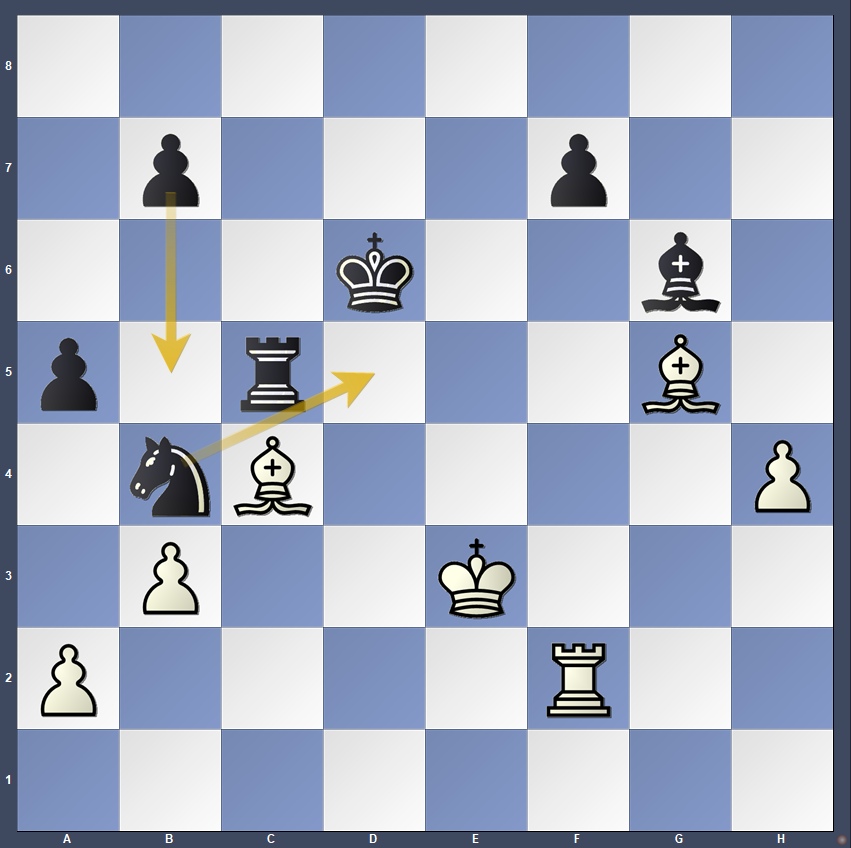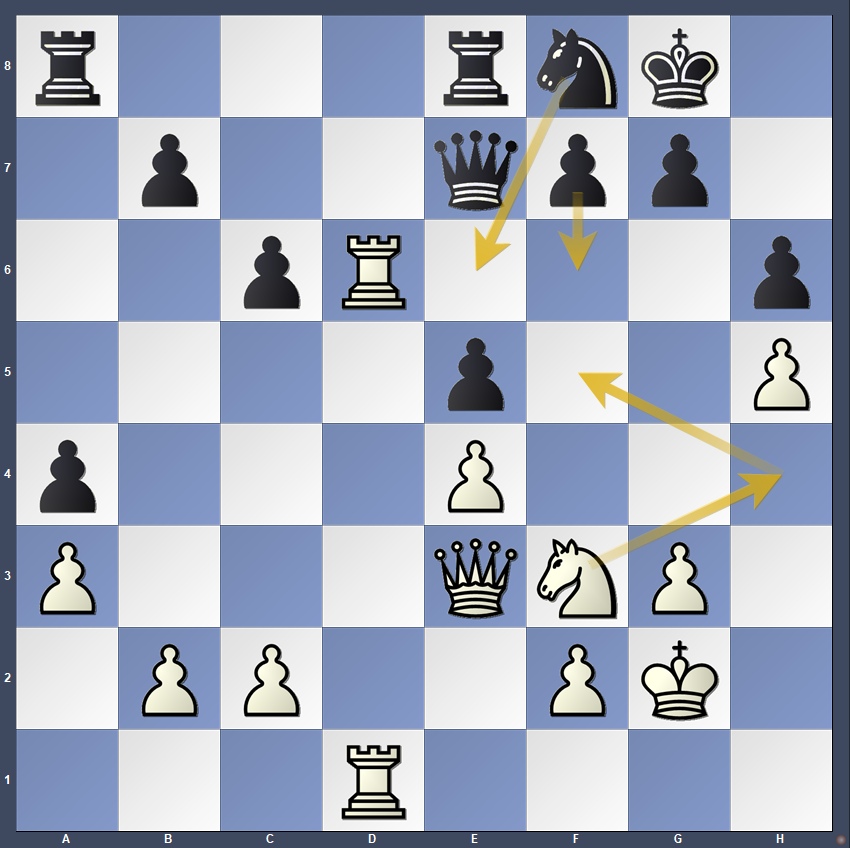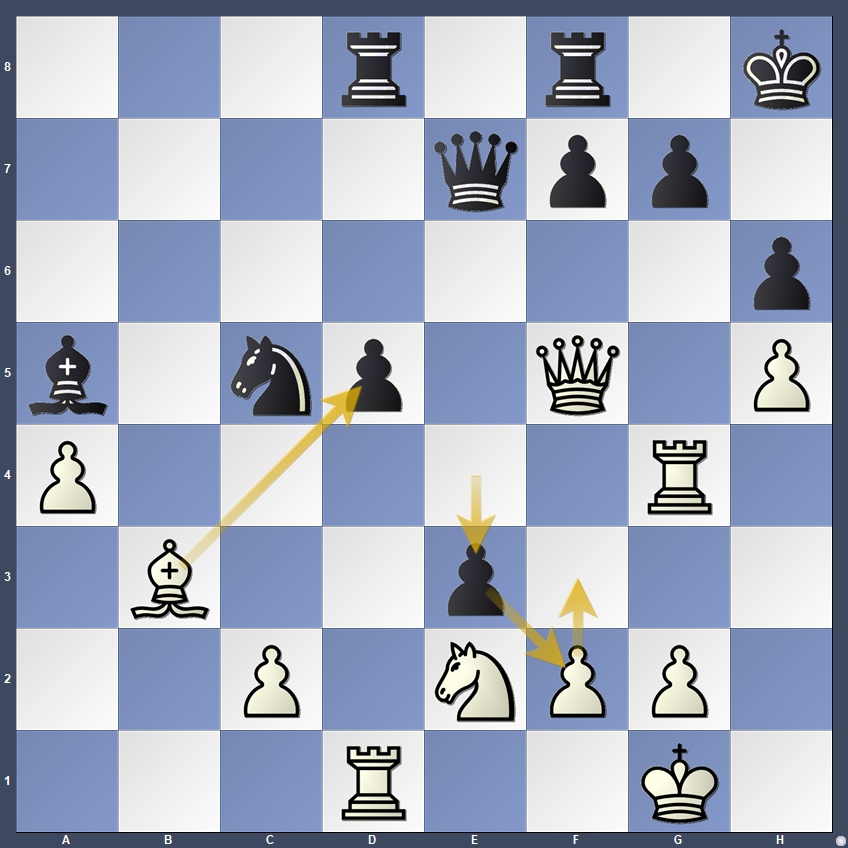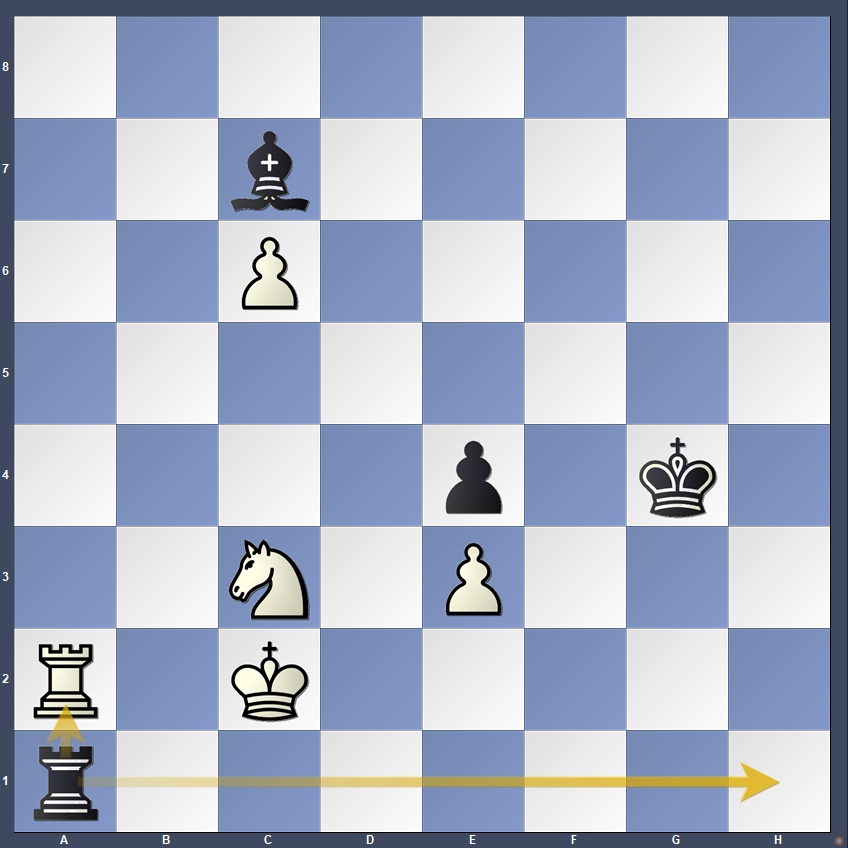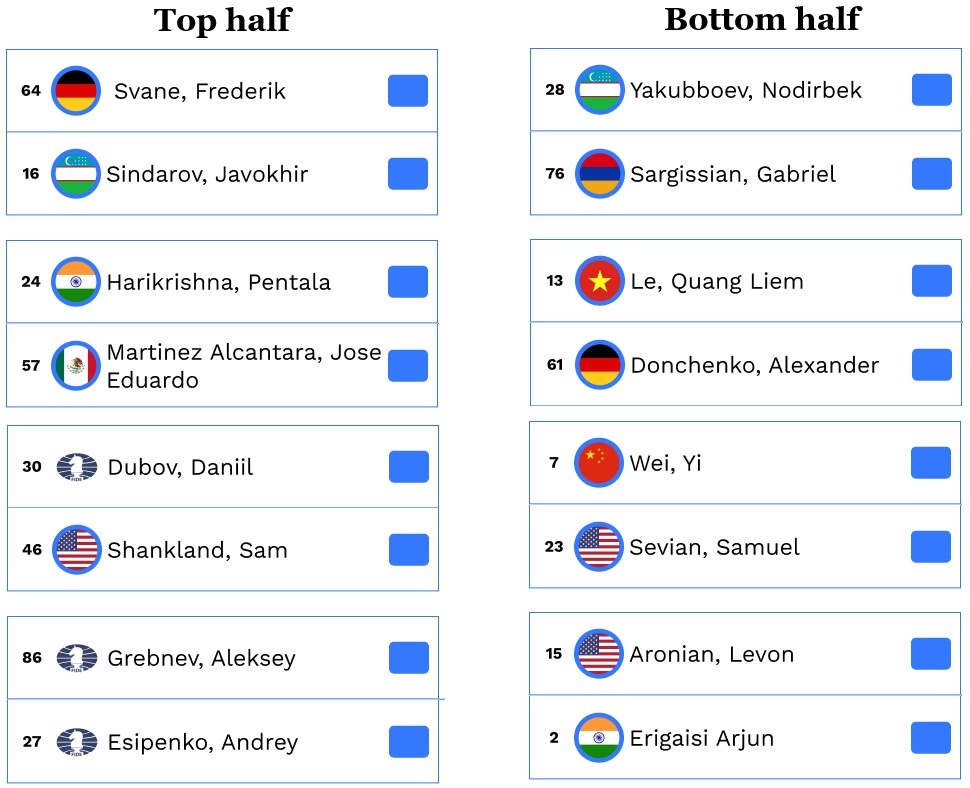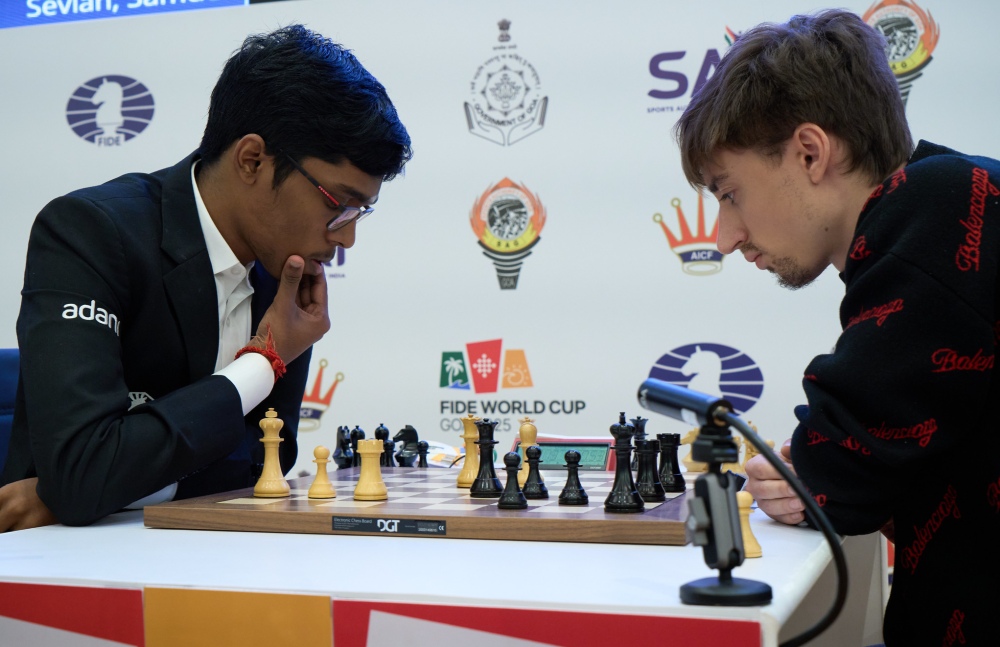
The fourth round of the FIDE World Cup in Goa ended with one of the most intense and dramatic tiebreak sessions of the event so far. Eleven matches returned to the playing hall this afternoon, with players battling it out across multiple time controls, from rapid to blitz and even Armageddon, to determine who would advance to the coveted round of sixteen.
From the very start, it was clear that this would be a day of upsets and surprises. Several top seeds were eliminated, including multiple +2700-rated players, as underdogs seized their chances in rapid and blitz play. Experience, stamina, and nerves of steel became as crucial as opening preparation, as every mistake carried immediate consequences.
By the end of the session, the field had been cut in half once again, revealing a captivating mix of established stars and fearless young talents. With just sixteen players remaining, the World Cup is entering its decisive phase, and the fight for the title, and for the coveted Candidates spots, is more open than ever.
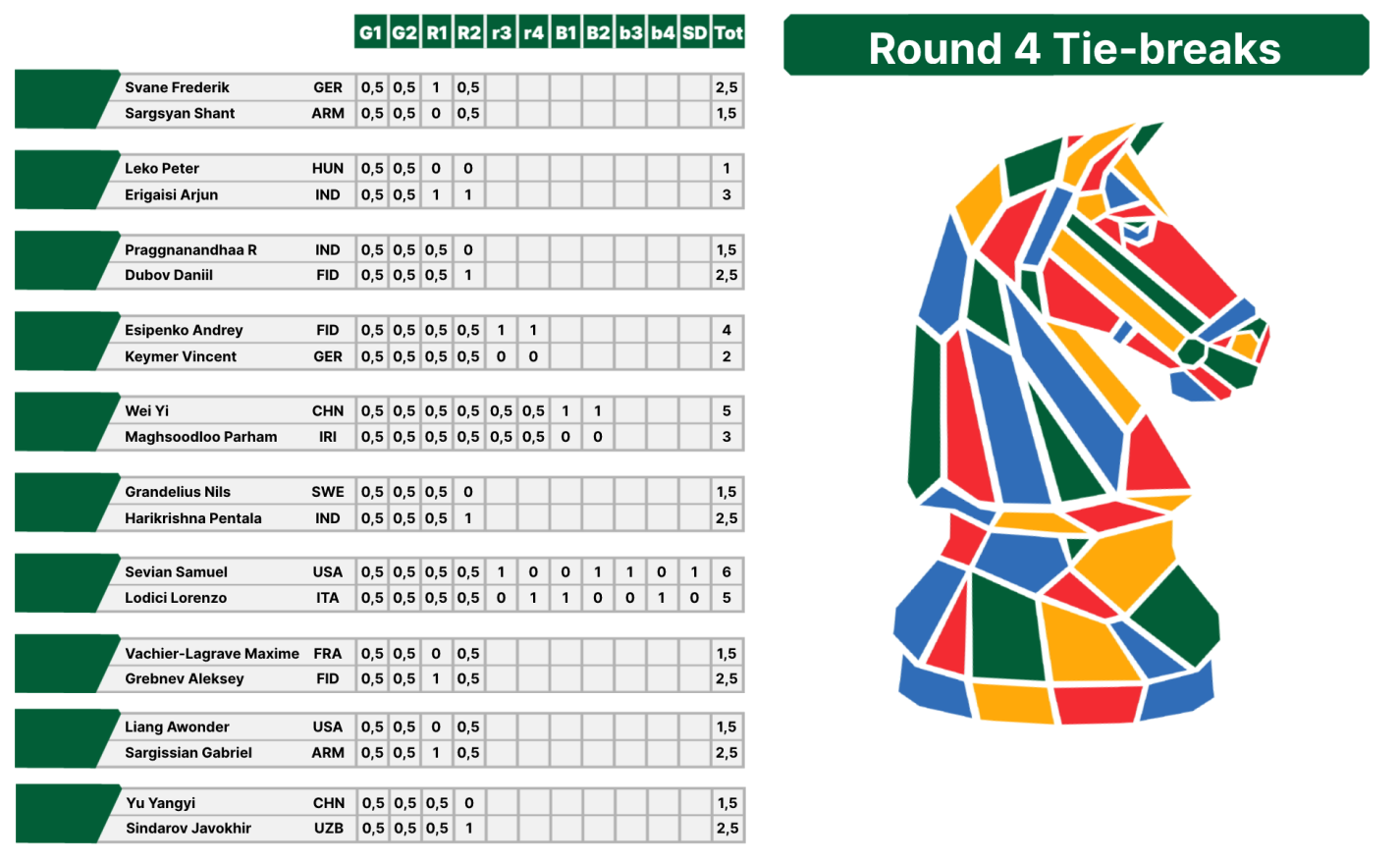
The round was opened by IA Dharmendra Kumar, President of the South Asian Chess Council and Chair of the 2025 FIDE World Cup Appeals Committee. He played 1.e4 for Peter Leko on board two.
Quite surprisingly, no fewer than eight of the eleven tiebreak matches were decided in the very first section of the afternoon, consisting of two 15-minute games with a 10-second increment.
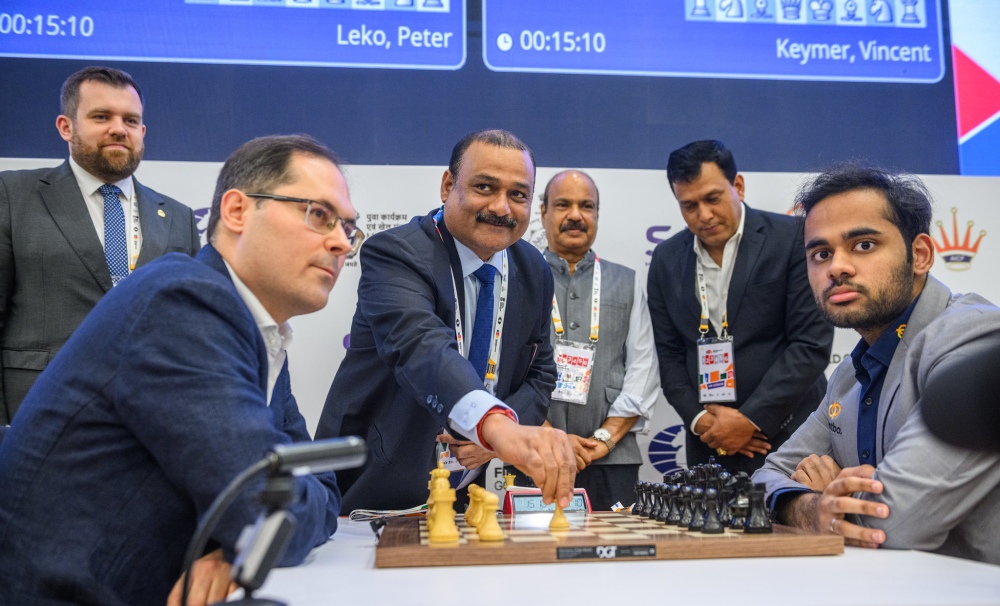
The first player to qualify for the round of sixteen and the biggest surprise of the day was GM Aleksey Grebnev (2611), who eliminated one of the pre-tournament favourites, GM Maxime Vachier-Lagrave (2737).
Known for his deep opening preparation and sharp tactical vision, Grebnev recently won the 2025 Dubai Open, a strong international event featuring several elite grandmasters, proving he is no stranger to facing world-class opposition.
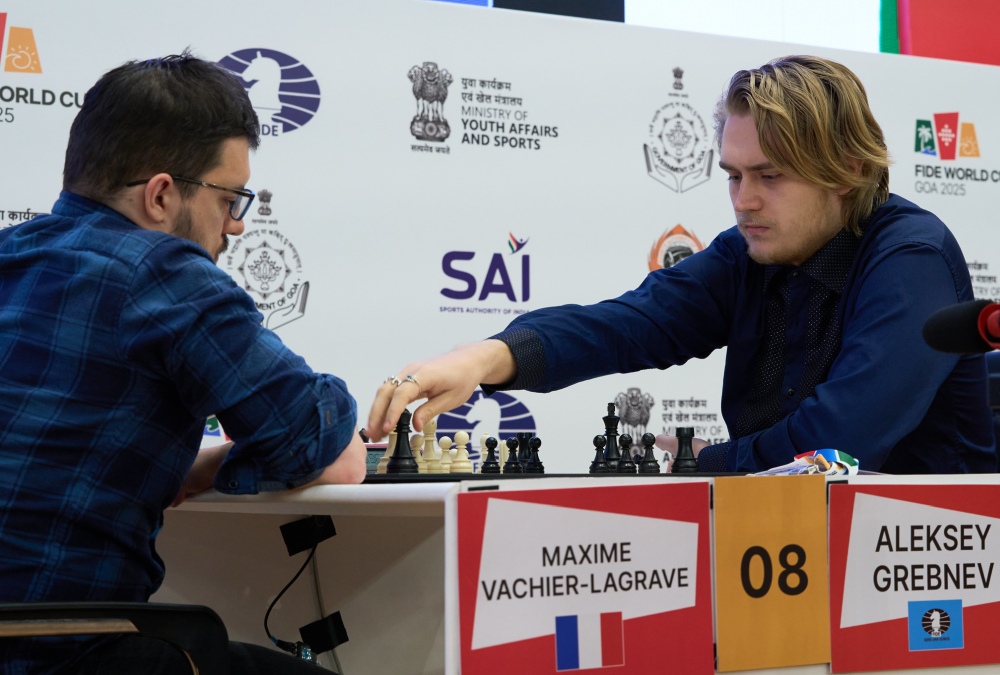
Although Vachier-Lagrave is a renowned specialist in blitz and rapid chess, Grebnev seized his chances brilliantly, winning the first game with White and then steering the second into a well-known theoretical draw to clinch the match.
The key moment came in the first game:
Despite being under pressure in a difficult endgame, the Frenchman still had drawing chances, but in time trouble he blundered with 47…Nd5+? (the correct move was 47…b5, with approximate equality). After 48.Kd4! b5 49.Bh6!, Black was suddenly lost due to the unstoppable threat of Bf8, which wins material.
Soon after, another of the 2700+ favourites fell. GM Richard Rapport (2724) will have to wait another two years for another shot at the title, after losing both rapid tiebreak games to GM Sam Shankland (2654).
A cornerstone of American chess for over a decade, known for his disciplined preparation and exceptional endgame technique, Shankland opted for the solid Caro–Kann Defence to neutralize Rapport’s creative initiative in the first game. The strategy paid off perfectly when the Hungarian number one faltered in the late middlegame.
“I wasn’t very optimistic going into the tiebreak. In classical, it hasn’t gone too badly, but in rapid, he’s clobbered me before,” Shankland admitted in his post-game interview. This time, however, he turned the tables convincingly.
In the second game, Rapport’s decision to employ the Pirc Modern Defence backfired spectacularly, as he soon found himself in a cramped, passive position, and Shankland efficiently converted the advantage, sealing the match with a 25-move miniature.
GM Nils Grandelius (2645) will also be leaving Goa tomorrow, eliminated by GM Pentala Harikrishna (2697). The long-time Swedish number one, celebrated for his deep opening preparation and creative ideas, came up short in the first game, letting his opponent off the hook at a critical moment.
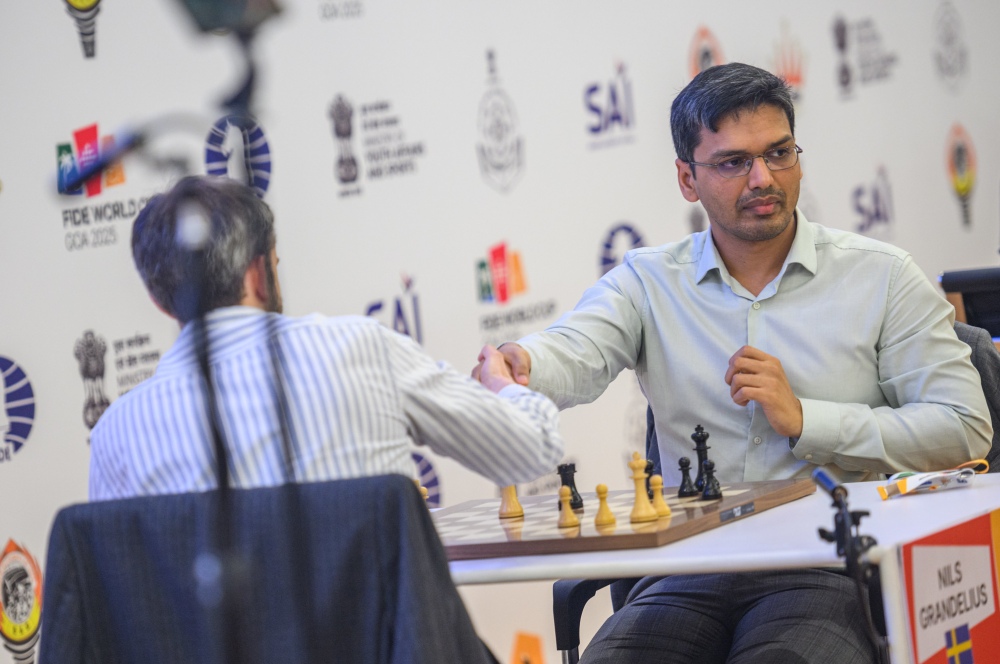
With the psychological edge on his side, the player from Andhra Pradesh, renowned for his strategic depth and superb endgame technique, displayed his full class in the second encounter. Harikrishna crafted a strategic masterpiece, patiently outmanoeuvring his opponent to secure victory and advance to Round Five.
By winning the first game and comfortably drawing the second, accepting a repetition in a completely winning position, GM Frederik Svane (2638) secured his spot in the round of sixteen, joining his compatriot Alexander Donchenko and confirming the impressive depth of the younger German generation.
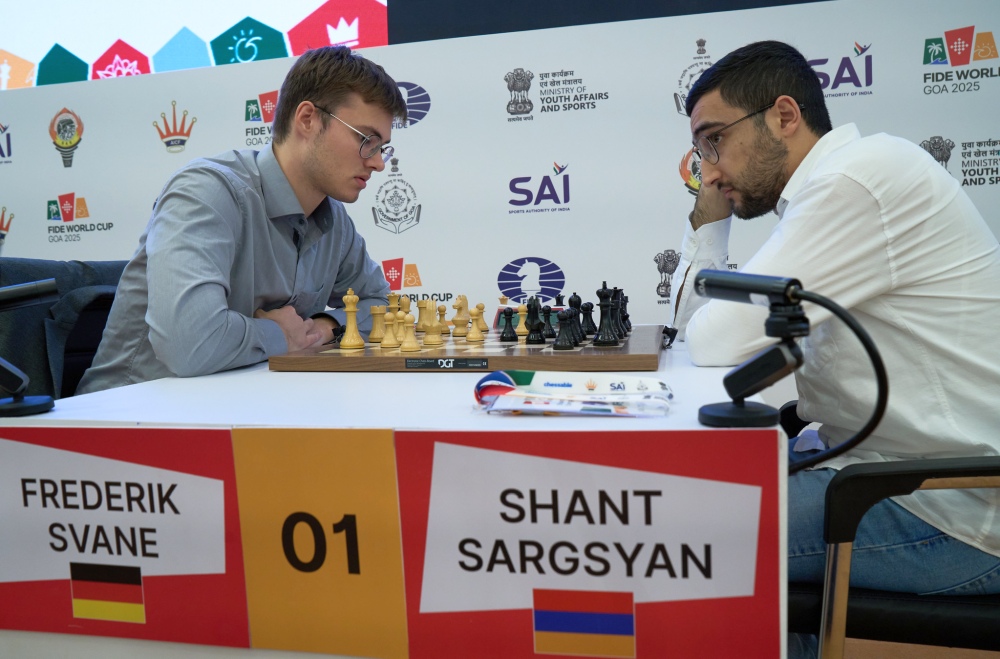
His opponent, GM Shant Sargsyan (2667) of Armenia, was unable to recover after losing the first game. The key moment came on move thirty
White’s control of the d-file and pressure on the e5-pawn promised a lasting edge. However, after 30…Ne6! 31.Nxe5 Qg5! 32.Qxg5 Nxg5, Black would still have had reasonable drawing chances.
Instead, short on time, Sargsyan spent two of his last three minutes to play 30…f6?, fatally weakening his kingside. Svane immediately seized the moment with 31.Nh4!, launching a decisive attack.
Notably, Black could no longer contest the d-file with 31…Rad8, as 32.Nf5! wins material after 32…Qc7 33.Rxd8 Rxd8 34.Rxd8 Rxd8 35.Qa7, picking up at least a pawn. Despite determined resistance, the Armenian grandmaster could not save the game.
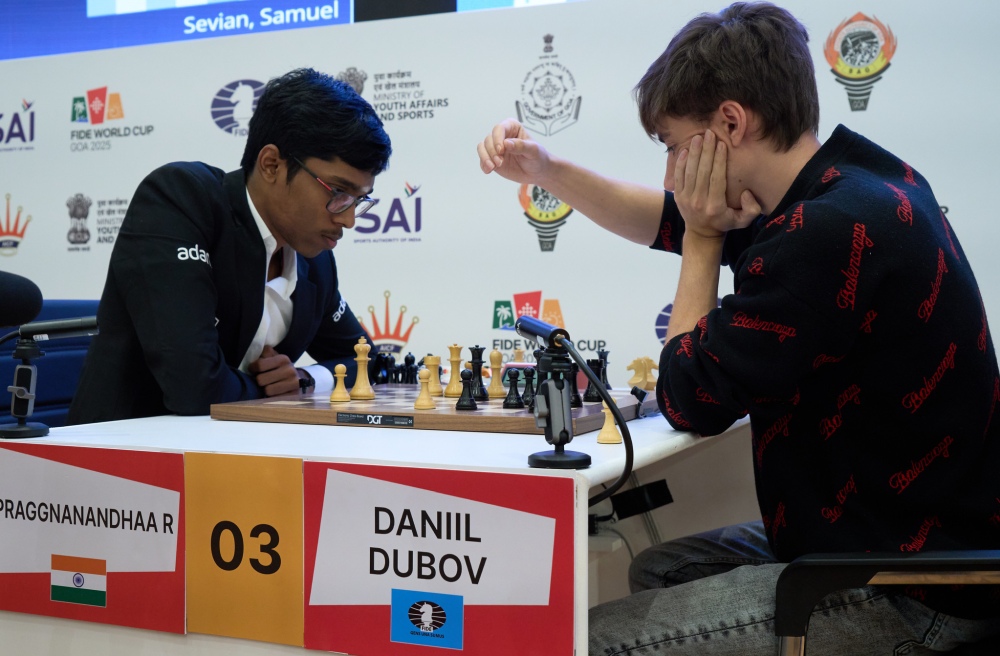
GM Daniil Dubov (2684) produced one of the major upsets of the day, eliminating the 2023 Baku finalist and Indian hero GM Praggnanandhaa R (2771). Continuing the same pragmatic approach that has served him well in earlier tiebreaks, Dubov offered an early 12-move draw with the White pieces, effectively shifting the pressure onto his opponent to create winning chances in the second game.
In his post-game interview with FIDE’s WIM Charlize van Zyl, Dubov explained his rationale: “Against players so good that I can’t really get an advantage in the opening, my strategy is to make a draw with White and get a game with Black.”
And once again, his plan worked perfectly. In the diagrammed position, with both players down to their final minute, Praggnanandhaa erred with 35.Bxd5?, allowing 35…exf2+ 36.Qxf2 Bb6!, after which the Indian grandmaster was unable to defend against the threats along the long diagonal.
“I don’t think he showed his best in this tournament, but even so, it was very close,” Dubov reflected after the game.
With each round that passes, GM Arjun Erigaisi (2773) looks increasingly likely to secure a spot in the Candidates Tournament. A member of India’s young and dynamic elite, Erigaisi is known for his precise calculation, universal style, and fearless preparation.
Not only does he hold the highest rating among the remaining players, but he continues to dispatch his opponents with remarkable composure and control.
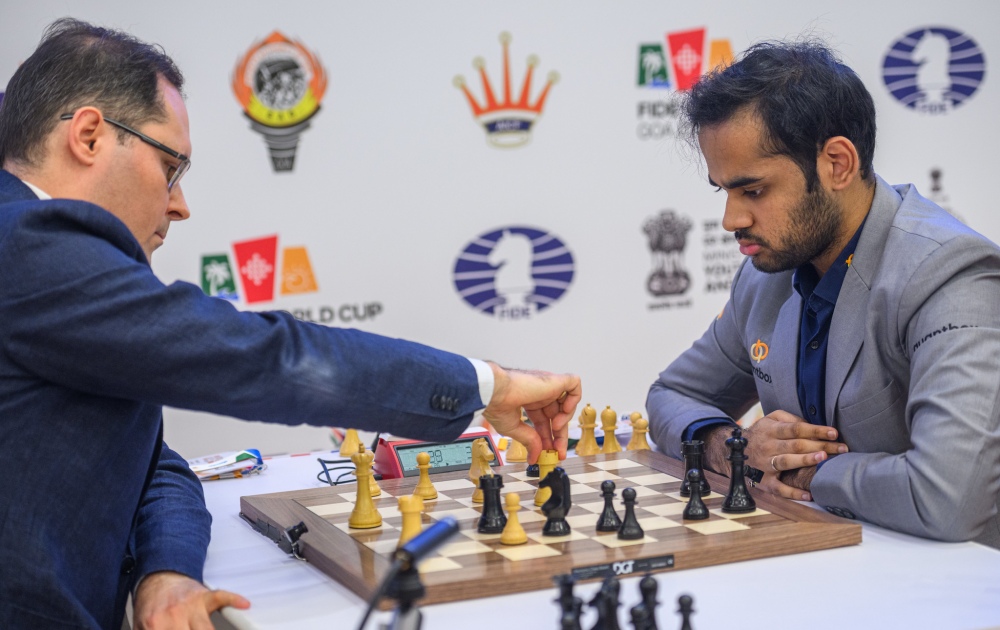
GM Peter Leko (2666), who will now join Jan Gustafsson in the official broadcast commentary team for the rest of the event, was no match for the Indian star in the rapid tiebreaks. In the first game, Leko sacrificed a pawn in pursuit of an attack but failed to generate sufficient compensation and was gradually outplayed in the ensuing endgame.
In the second encounter, Erigaisi maintained full control with the White pieces. Though Leko found a few drawing chances in the late middlegame, the Indian grandmaster never lost his grip on the position and eventually converted convincingly, sealing another impressive match victory.
A key figure in Armenia’s golden generation, GM Gabriel Sargissian (2624) has been instrumental in leading his national team to three Chess Olympiad gold medals (2006, 2008, 2012).
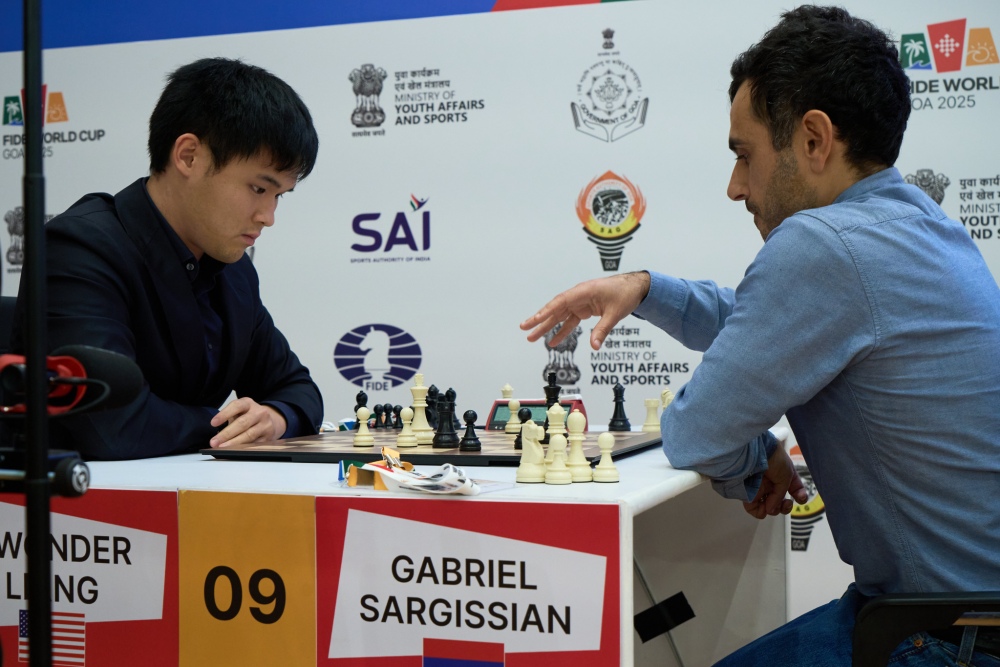
Renowned for his deep preparation and rock-solid style, Sargissian remains one of the most respected professionals on the circuit, and this afternoon he added another impressive victory to his résumé, eliminating America’s GM Awonder Liang (2710) by winning the first rapid tiebreak game and calmly drawing the second.
The key moment of the match came deep into the endgame. With both players under severe time pressure, Liang blundered with 62…Rh1?, allowing 63.Ra7!, after which the advancing c-pawn proved unstoppable, ultimately costing Black his bishop.
Instead, the engine confirms that the exchange of rooks would have maintained the balance: 62…Rxa2 63.Nxa2 Kf3! 64.Nb4 Kxe3 65.Nd5+ Kd4 66.Nxc7 Kc5 — a long and precise defensive line, but nearly impossible to calculate accurately with seconds remaining on the clock.
On paper, the match between GM Javokhir Sindarov (2721) and GM Yu Yangyi (2720), the opponents separated by just a single rating point, was one of the closest of the round.
It was a tough match,” explained Sindarov after the game. “Yu Yangyi is very solid, but I tried to take advantage of my chances in the match.”
Anything could have happened in the tiebreaks, but after a balanced draw in the first rapid game, Sindarov sealed the deal in the second, prevailing in a wild queen and pawn endgame. “We both know that certain positions are theoretically drawn, but rapid games are very stressful, and these types of positions are very difficult to play. The match took a lot of my energy, and I’m very tired,” admitted the Uzbek star after qualifying for the round of sixteen.
The three remaining matches, all of which ended in draws in both of their initial rapid games, advanced to the next stage of faster time controls: 10-minute games with a 10-second increment.
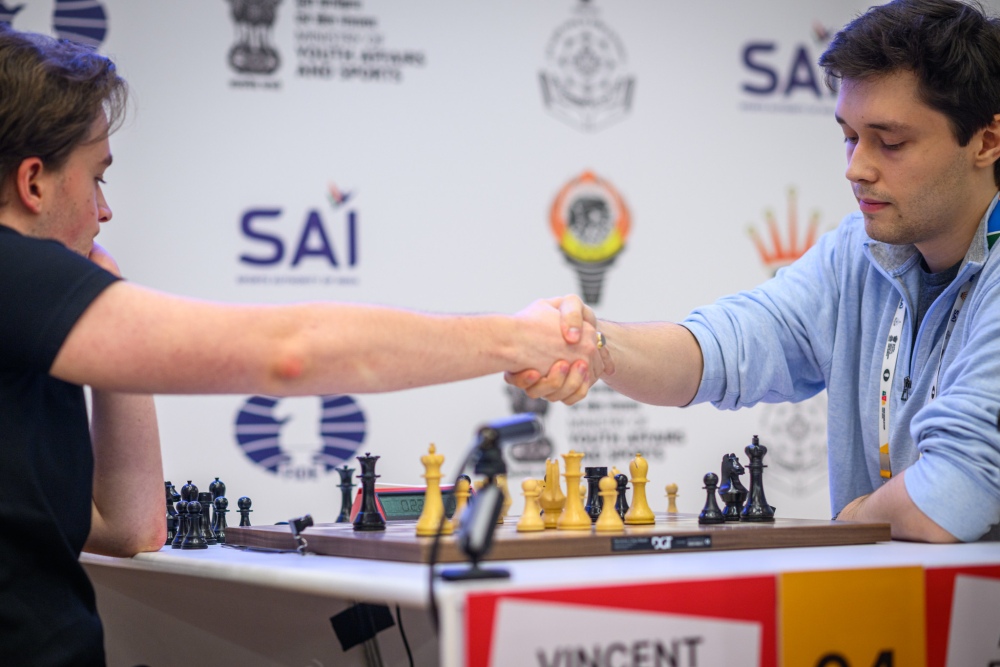
Only one of these encounters produced a decisive result, as GM Andrey Esipenko (2693) eliminated one of the main favourites to go all the way, GM Vincent Keymer (2755). “He is a tough player; it was a tough match. I couldn’t get anything with White, but I think I played well in the third game,” Esipenko explained after securing his qualification.
Born in 2002, Esipenko is one of the brightest talents of his generation. A former 2700+ player, he became a grandmaster at just 17 and quickly gained recognition for his universal style and fearless play against elite opposition.
Although Keymer was the favourite on paper, Esipenko dominated both 10/10 games, demonstrating clear superiority. The first two 15/10 games had been balanced, with Keymer even pressing slightly in the opener. However, a critical blunder in a rook endgame during the first of the shorter games decided the match, and the German was unable to recover in the rematch.
“He looked quite upset after the first loss, but he played a good game – he just collapsed in the time scramble,” Esipenko added, clearly satisfied to move on to the round of sixteen.
The two remaining matches of the day were decided in the blitz section. After four consecutive draws in the rapid games, GM Wei Yi (2754) finally broke through, showcasing his exceptional blitz skills to eliminate GM Parham Maghsoodloo (2697) and advance to the round of sixteen.
In the other match, GM Samuel Sevian (2698) joined his compatriot Sam Shankland in the next round after a dramatic victory over one of the revelations of this World Cup, GM Lorenzo Lodici (2560).
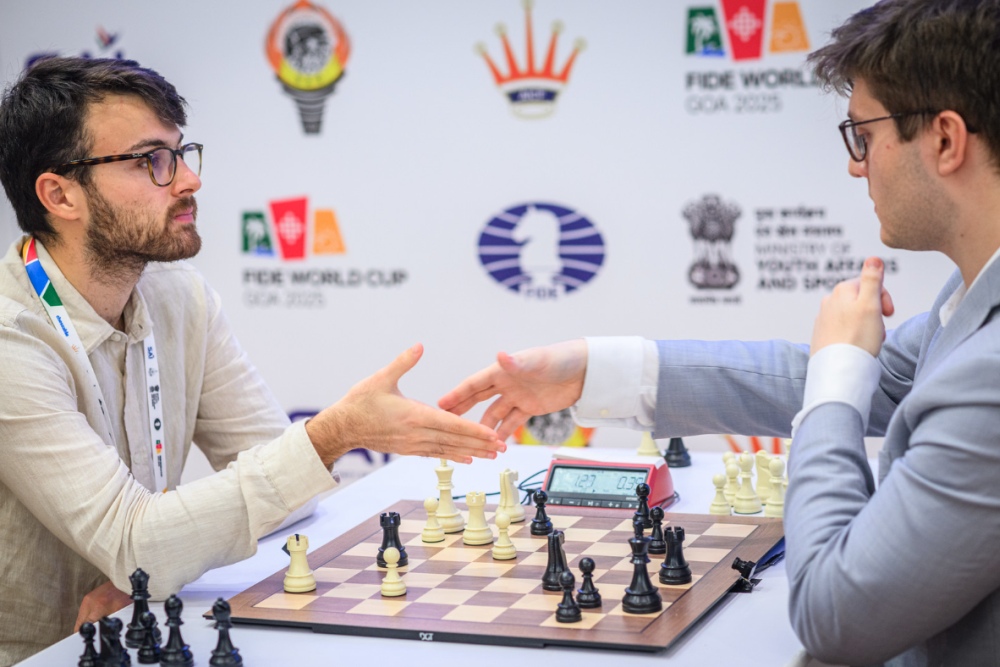
Their duel went the full distance, trading wins and losses throughout the tiebreaks, and was ultimately decided in Armageddon, without a doubt the most thrilling encounter of the day.
“It was a crazy match, back and forth, with both of us having chances. Lorenzo has played fantastic chess – on demand winning two very good games,” a visibly relieved Sevian told Charlize van Zyl moments after clinching the final game. “I bid a certain time that I would be happy with White or Black – that was my strategy.”
With these results, the field for the round of sixteen is now complete, a fascinating mix of rising prodigies and seasoned grandmasters, all still in contention for one of chess’s most prestigious titles.
ROUND 5 PAIRINGS
Game 1 of Round 5 will be played on November 14 at 3 PM local time.
The action can be followed live on the FIDE YouTube Channel, featuring expert commentary by GMs Evgenij Miroshnichenko and Jan Gustafsson.
To watch the games in person, tickets can be purchased [HERE]
Official website: worldcup2025.fide.com/
Written by IM Michael Rahal (Goa, India)
Photos: Michal Walusza and Eteri Kublashvili



